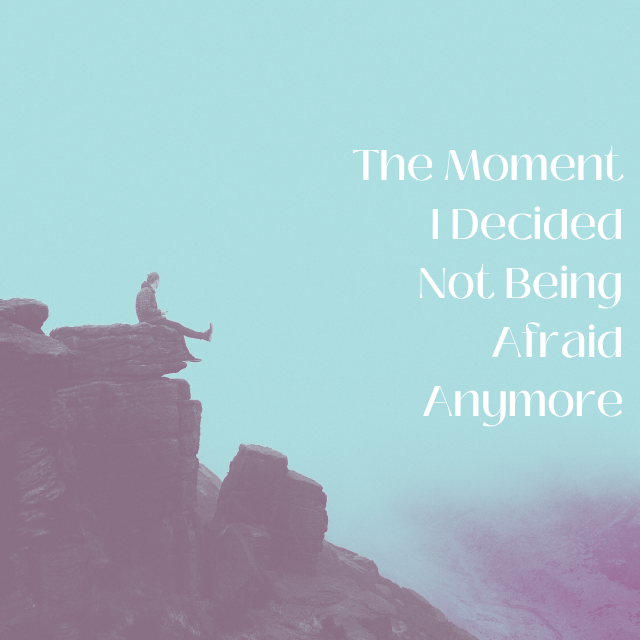“Courage is not the absence of fear, but the triumph over it.” – Nelson Mandela.
Fear is a powerful emotion that can hold us back from pursuing our dreams, taking risks, and fully embracing life. We all experience fear at some point in our lives. Overcoming fear is an important lesson I need to learn.
I was raised by a stern mother. She would use several ways to scare me about most of anything. Don’t want to eat? There will be a rice goddess coming for me at night. Don’t want to sleep? Several monsters will come and take me away. One story my mom is very fond of is about ghosts. She keeps telling scary ghost stories over and over again, even until now. These ghosts are not the cute or sweet ones, but the really scary ones (you can google Indonesian ghost stories for reference). Growing up with her obsession with ghosts and scary stories put a scar on me.
As a teenager, I was afraid of dark and haunted places. Anything related to death, ghosts, or spirits will keep me at bay. I often avoided horror movies, even driving alone at night. But this is easier said than done since I live in a society obsessed with horror. The horror obsession is real when the only local movies produced over 5 years are scary movies.
Living in this environment, it was hard not to be afraid. However, as I grew older, I realized that my fear was holding me back from experiencing life to the fullest. This realization led me on a personal journey of conquering my fears and finding the courage to face the unknown.
During the pandemic lockdown, I was so afraid of death. Mine or my loved ones. Hearing the never-ending ambulance sirens would send me to a cold shiver. The unknown behind the thin veil of death was really scary for me. And, to make it worse, the more fearful I feel, the worst my imagination came to mind.
For me, understanding the origins of my fear helped me to confront it and ultimately overcome it.
The Origins of Fear
Fear is a primal instinct that has evolved to protect us from physical harm and danger. Many factors contribute to the origins of fear, including our evolutionary history, personal experiences, and cultural influences. It is important to understand where our fears come from so that we can confront them in a meaningful way.
The evolutionary history of fear dates back to our ancestors, who lived in dangerous environments where they had to constantly be on the lookout for danger. In these environments, the ability to detect and respond to threats quickly was essential for survival. Fear is a natural response to perceived danger, and it triggers the “fight or flight” response, which prepares the body to either confront the danger or flee from it. This response is deeply ingrained in our biology and can be triggered by various stimuli that are associated with potential threats to our survival.
Over time, humans have evolved to become more complex and intelligent, but the basic mechanisms of fear remain the same. However, in modern society, many of the physical threats that our ancestors faced are no longer present, and our fears have shifted to more abstract concepts such as failure, rejection, and the unknown.
Despite these changes, fear still serves an important function in our lives. It can help us avoid danger and make better decisions by alerting us to potential risks. However, when fear becomes excessive, it can hold us back from experiencing life to the fullest, achieving our goals, or to outgrow a situation.
Understanding the evolutionary history of fear can help us approach our fears in a more constructive way. By recognizing that fear is a natural response to perceived danger, we can acknowledge overcoming our fears without feeling ashamed or embarrassed. This can help us take small steps towards facing our fears and ultimately overcoming them.
Uncertainty and Fear
When I looked back, I tried to identify why I was so scared of death and the supernatural world. I realized my parents were strong believers in superstitions and the afterlife. They would often share their own experiences and supernatural encounters, which have a deep impact on me. And I understand what I fear most from death is the pain before we cross over, and the uncertainty of what lies beyond.
After realizing the source of my fears, I made a decision not to let them control me anymore. A good friend once told me, “Anything can happen anywhere at any time. If you let your fear control you, you won’t be able to fully live your life.” This resonated with me as I realized that constantly living in fear was holding me back from fully embracing life.
I decided I did not want to live in fear anymore. Merely focusing on the present moment and appreciate the little things in life. I began to take more risks and step out of my comfort zone. I still feel fear sometimes, but I now understand that it is a natural emotion and I have the power to choose whether or not to let it control me. The most important thing is I learn to let go.
Letting go of fear is a liberating experience. I realized that my fear of death and the supernatural was not rooted in any tangible threat to my survival, but rather a result of cultural and personal influences. Instead of overthinking and worrying if something will happen during a flight, I just let go and trust that I am in capable hands. It is not an overnight change. It will take time and practice to let go of fear fully. I still worry and say silent prayers during turbulent flights. Now, strangely, when facing my fears, I also found comfort in the belief of an afterlife.
Overcoming Fear
Overcoming fear is a personal journey that requires time, effort, and self-reflection. Here are some tips that may help:
- Acknowledge your fear: It’s important to recognize and acknowledge your fears without feeling ashamed or embarrassed. By acknowledging your fears, you can begin to confront them in a meaningful way.
- Understand the origins of your fear: Fear has evolved over time to protect us from physical harm and danger. Understanding the evolutionary history of fear can help us to approach our fears in a more constructive way.
- Take small steps: Facing your fears can be intimidating, but taking small steps can help you build confidence and momentum. Start by setting small, achievable goals that will help you confront your fear.
Practice mindfulness: Mindfulness techniques like meditation and deep breathing can help you to stay calm and centered in the face of fear. By focusing on the present moment, you can reduce anxiety and increase your ability to cope with fear.
Remember, overcoming fear is not about eliminating it completely, but rather learning to manage it in a healthy way. By acknowledging your fears, understanding their origins, and taking small steps to confront them, you can gain the courage to pursue your dreams and live life to the fullest.
Author: Mia
A writer and researcher who also a tech-addict and internet-junkie. Loves quirky stuff.
The Haptic Room is supported by our readers. Our site may contain links to affiliate websites, and if you make a purchase through these links, we receive a commission to support our site.


One Reply to “The Moment I Decided Not Being Afraid Anymore”
Comments are closed.